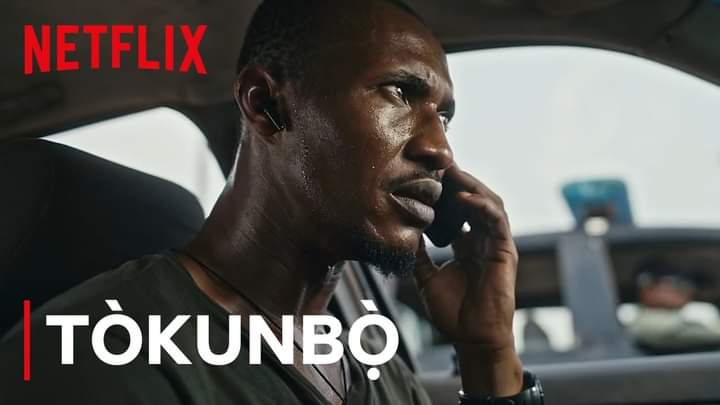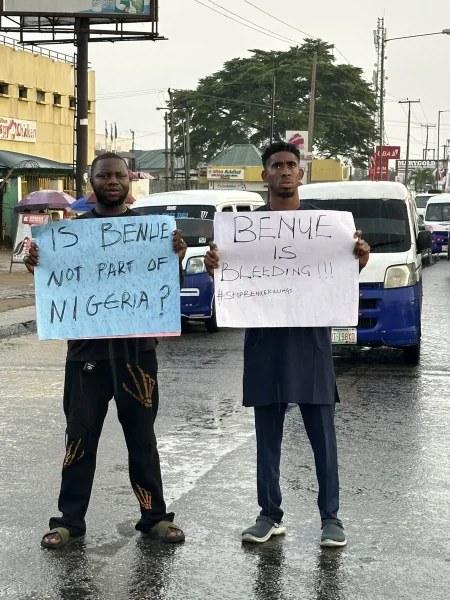I just finished watching Tokunbo, and I’ll say Chidi Mokeme is one hell of an actor. Comparing the role he played here with the one he played in Shanty Town, I have to say he is truly scary when portraying the head of a gang. It makes you wonder how many years Chidi spent in Lagos to embody this character and act it out so convincingly. Maybe e don learn from those danfo drivers who fit argue their way out of anything!
The opening scene, where Tokunbo returns from smuggling in a car, reminded me of a scene in Shanty Town when Scar (Chidi Mokeme) was calculating all the debt Shalewa (Nancy Isime) owed him when she went to buy her freedom. In Tokunbo, after returning from smuggling, Tokunbo comes to return the car keys to Gaza, and that particular trip was meant to be his last. His wife had just given birth, and he wanted to be a responsible father by being present. However, Gaza deducted ₦20,000 from his money because, according to him, Tokunbo had to pay for damages to the car. Imagine after all the stress, person still dey deduct your money—like when your bank suddenly collect maintenance fee for an account you no dey even maintain!
To top it off, in the same scene, Gaza still had to cut off a boy’s hand because he stole from him. Omo, in Tokunbo, he goes by the name Gaza, but he dey act like real Lagos agbero boss—no mercy, no pity, just pure wahala.
But omo, Bolt drivers dey see things oo! The scene where Tokunbo leaves Gaza’s workshop, after begging for money for his newborn child’s surgery, perfectly represents the different kinds of people Bolt drivers encounter daily—from couples who smooch and kiss in the car to those who dey fight like say dem no get another place. Honestly, na only Bolt drivers fit understand wetin Tokunbo dey face.
Lately, I’ve watched a few films that seem like they’re on the verge of taking off, but something just holds them back. It’s like they’re revving up, but they never quite hit the gas. Vanished into the Night is one that comes to mind—it wraps up just when things are about to get interesting. Then there’s Atlas, starring Jennifer Lopez. It spends so much time teasing the villain’s big plan but then does absolutely nothing with it. And don’t even get me started on Madame Web—the movie drags on, giving you the runaround, and just when you think the superhero action is about to kick in, it ends. Well, add Tokunbo to that list of frustrating films. Honestly, there’s not much to say because there’s barely anything to it, but let’s talk about it anyway.
Tokunbo, directed by Ramsey Nouah and written by Todimu Adegoke and Theckla Uzozie, follows the main character, Tokunbo, who’s delivering illegal cars for a gangster named Gaza, all while worrying about his pregnant wife. Tokunbo quickly realizes how dangerous Gaza is and decides to leave that life behind, focusing on his wife, Lisa, and their newborn son, Chris. The story then jumps ahead 18 months. We find out that Chris is sick and in the hospital, and Tokunbo is now driving a cab to make ends meet and cover Chris’s medical bills. But with money running out, he has no choice but to go back to Gaza for help. Surprisingly, even Gaza refuses him. So, Tokunbo goes back to driving his cab. That’s when he finds a cell phone left behind by a passenger, and it turns out to belong to a transporter who delivers illegal goods for big money. Tokunbo decides to take on the transporter’s role and makes a business out of it. But things get complicated when a girl named Nike is dumped in the back of his cab, and he’s told to deliver her to the Seme Border. Tokunbo starts second-guessing his decision to return to a life of crime, especially when he discovers that Nike is the daughter of the Central Bank governor, Folashade, who is ready to go to war to get her back.
The plot of Tokunbo isn’t exactly new. There are so many movies about a good guy who ends up with the wrong cargo and then has to go through hell because of it. So, I kept waiting for the writers to bring something fresh to the table, but sadly, they never did. They had everything they needed to make this story stand out—the political angle with the Central Bank governor and her policies, the medical angle with a disease affecting kids, and opportunities to explore themes of violence, morality, and justice. There was even the potential for a good twist or two. But they didn’t use any of it in an interesting way. Instead, they played it as safe and predictable as possible. Now, being predictable isn’t necessarily a bad thing these days, especially in the action-thriller genre where almost every story feels like a remix of something we’ve seen before. But you can still elevate it with some memorable dialogue or intense, heart-pounding moments. Unfortunately, it seems like the writers just weren’t interested in making anything that stands out.
The one star I’m giving Tokunbo is for its look. The movie is sweaty, and that’s something you hardly see in action films these days. You’ll see actors running, driving like maniacs, and fighting, yet they always look pristine, not a drop of sweat in sight. Sweat is a natural reaction to tense situations, and it adds a layer of realism that’s often missing. If you look at action films from the ‘80s and ‘90s, directors like John Woo, John McTiernan, and Tony Scott knew how to use sweat—it almost became an aesthetic choice. So, hats off to Ramsey Nouah for keeping his actors looking wet and shiny throughout the movie. The colors are decent, the costumes are okay, but where’s the action, the thrill, or the drama? That’s the real mystery here. I’m guessing budget constraints forced Nouah and his team to stick to scenes where people just stand around or sit down talking. They saved all their effort and money for that final fight between Tokunbo and Gaza, which ended up being horribly choreographed and edited. It just didn’t work for me. Maybe others will appreciate the finale and give the movie credit for trying, but I’m not in that mood right now. Sorry, not sorry.
You’ll find yourself emotionally invested in the characters. You’re on the edge of your seat, wondering what’s going to happen to Tokunbo or Folashade if this kidnapping plot actually works out. The film creates this underlying tension that really pulls you in and keeps you hooked for most of the runtime. With all the corruption in the country, the stakes are sky-high, and everyone’s got something to lose—whether it’s the country taking a hit because Folashade’s policies don’t get through, or Tokunbo failing to save his baby because he can’t come up with the money in time. The struggles they face are so relatable, and that’s what makes the story a bit engaging.
That’s something I really appreciate about our films. They’re relatable, even if they sometimes lack polish or rely a bit too much on convenient plot points. They still manage to keep you interested from start to finish, and Tokunbo is no exception. The corruption in the country is a major theme in Nollywood movies, adding realism to the story and an extra layer of tension. Throughout Tokunbo, you see how corruption has eroded the country’s moral fiber, throwing it into chaos and pushing good people into crime. These layers add depth to the film and make it even more compelling.
Even with some convenient plot points and a few inconsistencies, I found the twist at the end pretty intriguing. It’s handled well, and although the film is simple, that twist gives it just the right punch to stick the landing.
As for the acting, it’s fine during the first act because you’re still getting used to the tone. But by the time the second act rolls around, you realize that Nouah isn’t really pushing his cast to show their range. And by the third act, it’s clear that Nouah and his cast don’t have much left to offer. Gideon Okeke shows potential; he’s got the looks and energy to be an action star if given the right director. Darasimi Nadi, being a kid, gets a pass. But Majid Michel, Funlola Aofiyebi-Raimi, Chidi Mokeme, Tosin Adeyemi, Ivie Okujaye, and Adunni Ade all give such one-note performances that it’s just sad. In the end, Tokunbo is a snooze fest—nothing more, nothing less. If you’re in the mood for a Netflix film where a father races against time to save his kid, I’d recommend 60 Minutes by Oliver Kienle; it’s everything Tokunbo could have been.
For my rating, if I’m asked to give it a star, I’ll give it one star out of five. ★☆☆☆☆
But if I’m rating on a scale of 5, I’ll rate it 2.5/5.
This wasn’t a trifecta for Ramsey Nouah, because since he’s the one who directed it, I expected it to be on the same level as Living in Bondage: Breaking Free of 2019 and Rattlesnake: The Ahanna Story of 2020.
— Ginde.













